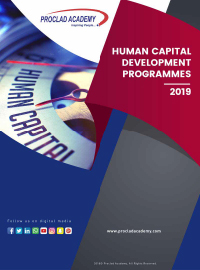Advanced Documents and Records Management: Global Standards & Methodologies
| Ref No. | Dates | Venue | Fee (US$) | |
|---|---|---|---|---|
| AD 004 | 12 - 16 Apr 2020 | Dubai | 4500 | Register |
| AD 004 | 30 Aug - 03 Sep 2020 | Dubai | 4500 | Register |
| AD 004 | 13 - 17 Dec 2020 | Dubai | 4500 | Register |
Advanced Documents and Records Management: Global Standards & Methodologies
Introduction
All organisations are required to keep records, regardless of industry or type of business. Document and records management affects everyone in the organisation, regardless of whether written into their job description or not. Records management has become a business imperative and spans all business units including core business activities. The complexities of modern organisations are such that records management programmes often span multiple legal jurisdictions, and different laws may apply. The advent of electronic records requires that all records on all media and formats should be managed in a consistent manner.
PROCLAD Academy’s Advanced Documents and Records Management: Global Standards & Methodologies training course is based largely on the international standards and methodologies for implementing Records Management. This training course is ideal for planning, setting up and managing physical and electronic records within the organisation. Participants will receive a number of templates and frameworks to kick start their records management improvement. This UNIQUE training course is a must for any staff member who has been appointed to manage records, or who has been allocated those responsibilities.
The key features of PROCLAD Academy’s Advanced Documents and Records Management: Global Standards & Methodologies training course are:
- It is based on and incorporates International Standards
- It includes management of records on all media, including paper, electronic and multi-media
- It provides a strategic framework for developing a records management programme, spanning all business units and territories affected
- It focuses on deriving business benefits, over and above meeting compliance requirements
Learning Objectives
By attending PROCLAD Academy’s Advanced Documents and Records Management: Global Standards & Methodologies training course, delegates will be able to:
- Understand the legal environment that surrounds records management and their responsibilities in terms of the law
- Make informed decisions relating to electronic records, and advise their organisations accordingly
- Conduct a records audit as a basis for developing a records management strategy
- Create and implement a records management roadmap and programme
- Use the DIRKS records management methodology in accordance with ISO 15489
- Understand the various standards applicable to records management
- Manage records on all formats
- Conduct an analysis of processes which impact on records management
- Develop a Business Classification Scheme or File Plan
- Implement a retention schedule
- Implement a systematic disposal programme to destroy or transfer records which no longer have value
- Understand the risks associated with various types of records media and protect against these risks.
- Understand Vital records, and implement a vital records plan
- Develop a change and communications plan.
- Implement an on-going audit and assessment programme.
Target Audience
PROCLAD Academy’s Advanced Documents and Records Management: Global Standards & Methodologies training course is designed for:
- Document controllers & administrators
- Records management professionals
- Senior registry officials
- Departmental heads responsible for records management
- Departmental/unit records coordinators
- IT staff responsible for records management
Attendance to this training course would enable delegates to develop a records management programme and implement it in their organisation. It would also help ICT individuals understand the importance of records management.
Training Methodology
PROCLAD Academy’s practical and results-oriented Advanced Documents and Records Management: Global Standards & Methodologies training course is based on adult learning concept. It incorporates short inspiring lectures with structured lessons from the learning manual; captivating PowerPoint slides with videos to enhance learning; ongoing discussions with action planning; ample time for Q&A; training activities to reinforce key concepts within a fun learning environment.
Course Outline
- Definitions and core concepts
- Understanding Documents v Records and the interrelationships between them
- Archives
- Managing electronic records
- Metadata and naming conventions
- Managing micrographic records
- Managing audio-visual records
- Managing security classified records in all formats
- Digital preservation
- Vital records
- Statutory and regulatory framework applicable to records management
- Managing records across borders
- Records Management standards
- Implications for Electronic records
- Setting up a Records Management programme:
- Creating a Records Management strategy
- Conducting a records assessment/audit using Generally Accepted Recordkeeping Principles (GARP)
- Implementing according to the standards (ISO 30300, 30301, 15489)
- The DIRKS Methodology (Developing and Implementing a Record Keeping System)
- Functions and responsibilities of a Records Manager
- Communications and change management
- How to create a communications plan
- Rolling out the plan
- Managing records on all media
- Paper-based records
- Cartographic records
- Audiovisual records
- Caring for magnetic media
- Magnetic tapes
- Diskettes
- Caring for optical media
- Micrographic records
- Audio-visual records
- Electronic Records Management
- Born-digital documents and records
- Scanned images
- Digital signatures
- Electronic Document and Records Management Systems (EDRMS)
- Designing, implementing and maintaining a records classification system
- Records Inventories and audits
- Creating Functional subject filing systems
- Designing and implementing a new file plan/classification scheme
- Integrating document and records management classification
- Records security classification
- Retention and Disposition
- Understanding the records lifecycle
- Creating retention schedules
- Creating a Systematic disposal programme
- Gaining control
- Current records
- Terminated records
- Applying for approval to destroy
- Current records
- Terminated records
- Disposal of records
- Destruction of records
- Transfer of Records
- Transfer to an archive
- Compliance Monitoring
- On-going audits
- Developing and conducting Maturity assessments


